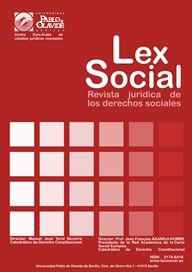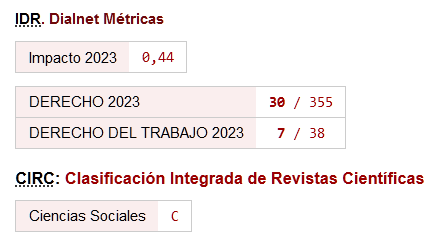Social function of property, adequate housing and international human rights law
DOI:
https://doi.org/10.46661/lexsocial.8138Keywords:
adequate housing, economic, social and cultural rights (ESCR), international human rights law, right to propertyAbstract
This paper introduces the added value of a broad approach to human rights to balance the relationship between tenant’s right to adequate housing and landlord’s right to property. Firstly, it presents briefly how international human rights law treaties and monitoring bodies have dealt with, and chosen not to deal with, the right to property. Secondly, it introduces the right to adequate housing as proclaimed as a social right in international human rights law. Third, it argues that the human rights community, particularly those working on economic, social and cultural rights – such as housing – should engage with the right to property directly. Finally, the paper articulates the beginnings of a proposal to reinterpret property and its social function from a holistic approach to human rights, one that takes adequate housing and other socio-economic rights seriously when holding public authorities to account.
Downloads
References
CASLA, K., "Rights and Responsibilities: Protecting and Fulfilling Economic and Social Rights in Times of Public Health Emergency", in Covid-19, Law and Human Rights: Essex Dialogues (FERSTMAN, C. & FAGAN, A., eds, University of Essex, 2020).
CASLA, K. "Unpredictable and Damaging? A Human Rights Case for the Proportionality Assessment of Evictions in the Private Rental Sector", European Human Rights Law Review, 2022(3).
CASLA, K., "The Right to Property Taking Economic, Social and Cultural Rights Seriously", Human Rights Quarterly, 2023, 45(2). https://doi.org/10.1353/hrq.2023.0010
DUGUIT, L., Les Transformations Générales du Droit Privé Depuis le Code Napoléon (Librairie Félix Alcan 1912).
DURANTI, M, The Conservative Human Rights Revolution: European Identity, Transnational Politics, and the Origins of the European Convention, Oxford University Press, 2017. https://doi.org/10.1093/acprof:oso/9780199811380.001.0001
EPSTEIN, R., "The plasticity of property: legal transitions between property rights regimes for different purposes", en The Changing Role of Property Law (NORDTVEIT, E., ed, Edward Elgar, 2023).
FOSTER, S.R. y BONILLA, D., The Social Function of Property: A Comparative Perspective, Fordham Law Review, 2011, 80.
MILANOVIC, B., Capitalism, Alone, Harvard University Press, 2019. https://doi.org/10.4159/9780674242852
O'CINNEIDE, C., "The Potential and Pitfalls of Intersectionality in the Context of Social Rights Adjudication", en Intersectionality and Human Rights Law (ATREY, S. y DUNNE, P., eds, Hart, 2020).https://doi.org/10.5040/9781509935321.ch-003
ROSEVEAR, E., HIRSCHL, R. y JUNG, C., "Justiciable and Aspirational Economic and Social Rights in National Constitutions," en The Future of Economic and Social Rights (YOUNG, K., Cambridge University Press, 2019). https://doi.org/10.1017/9781108284653.003
WILSON, S., "Litigating housing rights in Johannesburg's inner city: 2004-2008", South African Journal on Human Rights, 2011, 27(1). https://doi.org/10.1080/19962126.2011.11865008
Downloads
Published
How to Cite
Issue
Section
License
Copyright (c) 2023 Koldo Casla

This work is licensed under a Creative Commons Attribution-NonCommercial-ShareAlike 4.0 International License.
-
Atribución — Usted debe dar crédito de manera adecuada, brindar un enlace a la licencia, e indicar si se han realizado cambios. Puede hacerlo en cualquier forma razonable, pero no de forma tal que sugiera que usted o su uso tienen el apoyo de la licenciante.
-
NoComercial — Usted no puede hacer uso del material con propósitos comerciales.
-
CompartirIgual — Si remezcla, transforma o crea a partir del material, deberá difundir sus contribuciones bajo la misma licencia que el original.



 @Lex Social
@Lex Social Linkedin
Linkedin @lexrevista.bsky.social
@lexrevista.bsky.social


